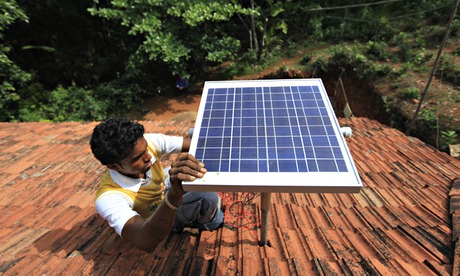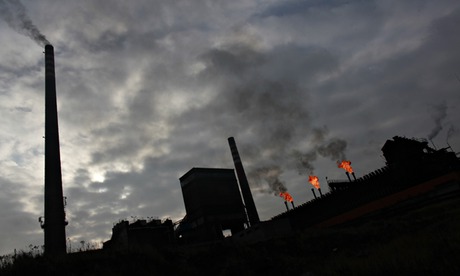The world can still act in time to stave off the worst effects of climate change, and enjoy the fruits of continued economic growth as long as the global economy can be transformed within the next 15 years, a group of the world's leading economists and political leaders will argue on Tuesday.
Tackling climate change can be a boon to prosperity, rather than a brake, according to the study involving a roll-call of the globe's biggest institutions, including the UN, the OECD group of rich countries, the International Monetary Fund and the World Bank, and co-authored by Lord Stern, one of the world's most influential voices on climate economics.
The report comes ahead of a UN-convened summit of world leaders on global warming next week at which David Cameron has pledged to lead calls for strong action.
"Reducing emissions is not only compatible with economic growth and development – if done well it can actually generate better growth than the old high-carbon model," said Stern.
It is his most significant intervention in climate politics since the landmark 2006 Stern review of the economics of climate change, which made the case that tackling climate change as a matter of urgency will be cheaper than attempting to deal with the effects of the problem decades in the future. That report marked a revolution in thinking on global warming, and was a major factor in the agreements forged in Copenhagen in 2009 by which developed and major developing countries for the first time set out joint measures to reduce greenhouse gas emissions.
The economic transformation proposed in the new report will improve the lives of billions, the authors argue, from people suffering from air pollution in crowded cities to farmers struggling with poor soils in developing countries, the authors found. But achieving this change will require strong political action to set limits on carbon dioxide emissions, while promoting alternatives such as renewable energy, sustainable cities, teaching modern farming techniques and better-designed transport.
The world is expected to add billions of people to the global population in the next two decades, and trillions of dollars in economic growth – but if the massive expected growth of developing world cities is poorly managed, and global investment is poured into existing high-carbon infrastructure, then a unique opportunity to change the pattern of prosperity will have been lost, and billions of people will be left the poorer as a result, the report warns.
Stern gave the example of cities, which if designed on public transport can have more efficient economies – because people aren't spending hours commuting and polluting, with its attendant effects on health – as well as better quality of life and lower carbon emissions.
The energy and climate change secretary, Ed Davey, told the Guardian that the UK has already seen benefits from focusing on clean development, and was committed to helping developing countries do the same. He said: "It has required UK business and international investors to recognise the costs of failure and the benefits of change and it has been sustained by a strong, vocal and committed network of NGOs, pressure groups and activists who have been instrumental in sustaining political will and public acceptance."
 Promoting renewable energy sources is a key feature in achieving economic transformation, the report says. Photograph: Rafiq Maqbool/AP
Promoting renewable energy sources is a key feature in achieving economic transformation, the report says. Photograph: Rafiq Maqbool/AP
At next week's climate summit, the UN secretary general, Ban Ki-moon, will convene heads of state and government from around the world to discuss climate change for the first time since the 2009 Copenhagen conference, which produced the first commitments from major developing countries such as China and India to curb emissions, and marked the first time the US agreed to binding emissions targets, but was widely derided for the scenes of chaos that accompanied it.
Convening world leaders again is a risky strategy, but is seen by the UN as essential to lay the ground for a crunch meeting in Paris next year, at which world governments will attempt to forge a new agreement that will cut global greenhouse gas emissions after 2020, when current pledges run out. The EU has vowed to cut emissions by 40% by 2030, compared with 1990 levels, but is the only major developed country bloc to have laid out clear plans.
Today's report, the New Climate Economy, from the Global Commission on the Economy and Climate, says that although technological "fixes" to climate change – such as renewable energy, low-carbon fuels, better urban design and better use of agricultural land – are growing fast, they are currently nowhere near enough to produce the transformation needed. As new power stations, cities and transport networks are built today, they are still being engineered on a high-carbon basis – coal-fired power plants, roads rather than public transport, slums without facilities rather than planned developments – and once these are built they lock in high carbon emissions for decades to come. Breaking that cycle requires a coordinated effort, from rich and poor countries, that prioritises sustainability and penalises high-carbon growth, for instance through a price on carbon.
Such efforts will come at a price, but this is far outweighed by the benefits in economic growth and improvements in health, the report suggests. For instance, reducing the world's dependence on coal and other dirty fuels will cut air pollution and remove a key source of strain on healthcare systems.
The Global Commission on the Economy and Climate, launched a year ago by the UK along with six other countries, has involved the World Bank, the International Monetary Fund, the OECD, the International Energy Agency and the UN, as well as several research institutes, and former world premiers. It has been chaired by the Mexican president, Felipe Calderón, and advised by leading economists including Lord Stern and Nobel prize winners Daniel Kahneman and Michael Spence.
Ottmar Edenhofer, chief economist at the Potsdam Institute for Climate Impact Research, and an adviser to the report, said: "Economic growth and emissions reductions can be achieved together, the report clearly confirms … Pricing CO2 is key. The heaven above us today is a waste dump for gases that harm our climate system. Wealthy states are disposing of them, free of charge, at the expense of all of us. If emitting CO2 came at a reasonable price, this would stabilise investors' expectations so they can push forward the innovation of climate friendly technologies."

